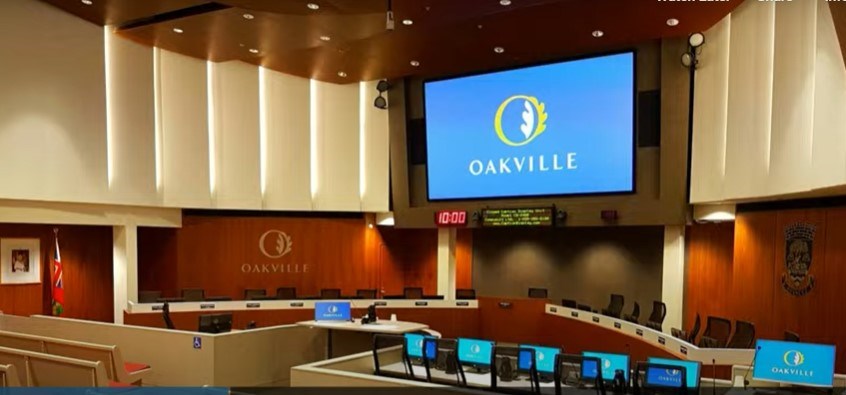Oakville town council has voted against allowing extra density in existing neighbourhoods, turning its back on a possible federal housing grant of up to $25 million.
Last summer, the town applied for cash from the Housing Accelerator Fund (HAF), a $4 billion federal program aiming to speed up the building of new homes across the country.
But to get the money, councillors were told they needed to change Oakville’s planning rules.
Federal housing minister Sean Fraser demanded Oakville permit four housing units on every residential property in the town, as well as four-storey apartment buildings on properties within 800 metres of Sheridan College.
Read more here: College Park residents angry with four-storey apartments proposed for neighbourhood
Council rejected that demand with a 14-1 vote at its planning and development meeting earlier this week, on Monday, May 6, 2024.
"We don’t need to risk our neighbourhoods’ livability for the small amount in the Housing Accelerator Fund grant," said Mayor Rob Burton. "Thanks to our financial strength, we don’t have to accept a bad deal. We can say no to the HAF conditions."
Preserving the character of stable established neighbourhoods by directing new development to specific growth nodes is the premise of the town’s official plan, noted Burton, who has also made it the foundation of his political career.
Needs of young people "too inconvenient"
Across the country, many municipalities have been loosening restrictive zoning rules that limit neighbourhoods to single family homes, in an attempt to increase housing supply and improve affordability.
At the May 6 meeting, a number of young people urged councillors to accept the federal government’s suggested changes.
Allowing fourplexes would give Oakville more housing options and improve affordability without introducing contentious tall towers, said delegate Matheus DaSilva.
"If you truly dislike having tall buildings in our town, this bylaw is an exquisite opportunity to move forward with more spread out, gentle density that will allow Oakville to grow more naturally and organically," he said.
"By pushing the housing crisis away and pretending it doesn’t exist, Oakville is neglecting its own residents who have shaped and will shape its community."
Talia Gonzales said the town’s priorities favour older generations over young people who need housing options to be able to remain in Oakville.
"If you’re someone who cannot afford to live in a single-family home or can’t afford to own a car and has to rely on other methods of transportation, clearly Oakville does not welcome you, even if you were born and raised here," she said. "Your wants and needs are too inconvenient for everyone else who Oakville clearly does care for."
And Jeffrey Belcher told councillors that, even though he is a 23-year-old who earns a decent salary, he has no housing options that will allow him to remain in the town where he grew up.
"It seems like people are more concerned with aesthetics than actually building housing to support the next generation," he said.
"The reality is that you guys really oppose everything. You oppose duplexes, triplexes, fourplexes, mid-rise, high rise. Are you for anything at all?"
The housing and affordability concerns of those young people resonated with Ward 1 councillor Sean O’Meara, who offered the only vote in favour of increased density.
"I’m thinking of these young kids and I’m thinking of my kids," he said. "A lot of the decisions we’re gong to make today are for 25 or 30 years from now."
O’Meara added that integrating more homes into existing neighbourhoods is a cost-effective way to grow.
"Tall and sprawl is not a good way to use infrastructure. Part of the argument for gentle density is that you put it in where infrastructure exists already and that includes community centres and schools and libraries and pipes and water and roads and sidewalks and parks."
"Four as-of-wrong”
Councillors also heard from residents living near Sheridan College who were upset with the possibility of allowing four-storey apartment buildings in their neighbourhood. Many suggested that the college should do more to house students on its own property.
Council approved the creation of a task force to work with the school and find ways to create housing on the campus.
Several town councillors proposed that federal housing grants should be given directly to Sheridan to help build student housing.
Ward 2 councillor Cathy Duddeck also suggested that significant changes to town-wide zoning – including allowing four units per lot – should only be adopted if approved through a referendum.
"Four as-of-right is four as-of-wrong," she said, to applause from the crowded council chamber. "Oakville residents spoke loud and clear about the importance of preserving their stable residential neighbourhoods when they supported our Livable Oakville plan."
The term 'four as-of-right' means that residential property owners can build four units – either a fourplex, or a detached home with basement or laneway suites – without seeking rezoning permission.
Under current provincial rules that apply to Oakville, all residential properties can already include three units, as-of-right.
